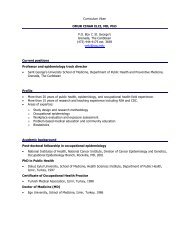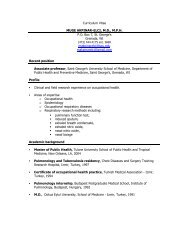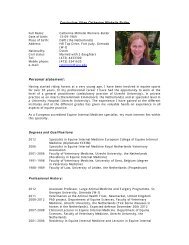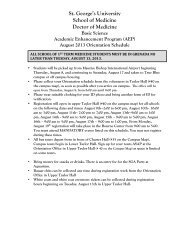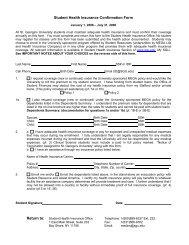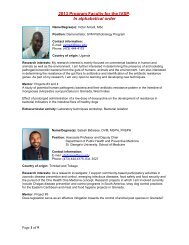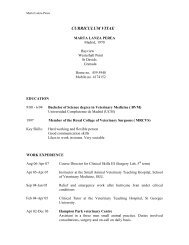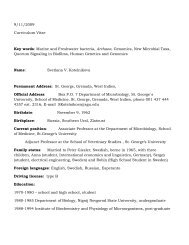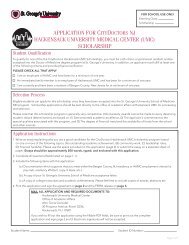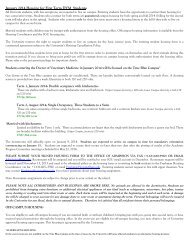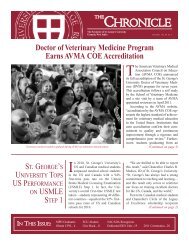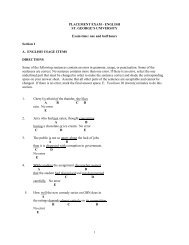SCHOOL OF 2012-2013 - St. George's University
SCHOOL OF 2012-2013 - St. George's University
SCHOOL OF 2012-2013 - St. George's University
You also want an ePaper? Increase the reach of your titles
YUMPU automatically turns print PDFs into web optimized ePapers that Google loves.
Four-Year Medical Program Objective Outcomes<br />
Mission<br />
To provide an international, culturally diverse environment in which students learn the knowledge, skills and behaviors<br />
required for postgraduate training in the health profession, while being inspired to develop compassion, curiosity, tolerance<br />
and commitment to patients and society, dedication to life-long learning and an understanding of the vital role of research<br />
in health care.<br />
Four Year Outcome Objectives<br />
1. Medical Knowledge<br />
a. Apply the multidisciplinary body of basic sciences to<br />
clinical analysis and problem solving using:<br />
2. Clinical Skills<br />
a. Communicate effectively with patients, their families<br />
and members of the health care team.<br />
School of Medicine<br />
Doctor of Medicine<br />
ii. The knowledge of normal structure, function,<br />
physiology and metabolism at the levels of the<br />
whole body, organ systems, cells, organelles and<br />
specific biomolecules including embryology,<br />
aging, growth and development.<br />
iii. The principles of normal homeostasis including<br />
molecular and cellular mechanisms.<br />
iv. The etiology, pathogenesis, structural and<br />
molecular alterations as they relate to the<br />
signs, symptoms, laboratory results, imaging<br />
investigations and causes of common and<br />
important diseases conditions.<br />
b. Incorporate the impact of factors including aging,<br />
psychological, cultural, environmental, genetic,<br />
nutritional, social, economic, religious and<br />
developmental on health and disease of patients as<br />
well as their impact on families and caregivers.<br />
c. Utilize the important pharmacological and nonpharmacological<br />
therapies available for the prevention<br />
and treatment of disease based on cellular and<br />
molecular mechanisms of action and clinical effects.<br />
Identify and explain factors that govern therapeutic<br />
interventions such as clinical and legal risks, benefits,<br />
cost assessments, age and gender.<br />
d. Apply the theories and principles that govern ethical<br />
decision making in the management of patients.<br />
e. Evaluate and apply clinical and translational research<br />
to the care of patient populations.<br />
b. Obtain a comprehensive and/or focused medical<br />
history on patients of all categories.<br />
c. Perform physical and mental status examinations on<br />
patients of all categories appropriate to the patient’s<br />
condition.<br />
d. Document pertinent patient health information in a<br />
concise, complete and responsible way.<br />
e. Select appropriate investigations and interpret the<br />
results for common and important diseases and<br />
conditions.<br />
f. Recognize and communicate common and important<br />
abnormal clinical findings.<br />
g. Develop a problem list and differential diagnosis<br />
based on the history, physical findings and initial<br />
investigations.<br />
h. Apply effective problem solving strategies to<br />
patient care.<br />
i. Perform routine and basic medical procedures.<br />
j. Provide patient education for all ages .regarding health<br />
problems and health maintenance<br />
k. Identify individuals at risk for disease and select<br />
appropriate preventive measures.<br />
l. Recognize life threatening emergencies and initiate<br />
appropriate primary intervention.<br />
m. Outline the management plan for patients under<br />
the following categories of care: preventive, acute,<br />
chronic, emergency, end of life, continuing and<br />
rehabilitative.<br />
Continued on next page.<br />
School of Medicine Catalog <strong>2013</strong>–2014 | 29



